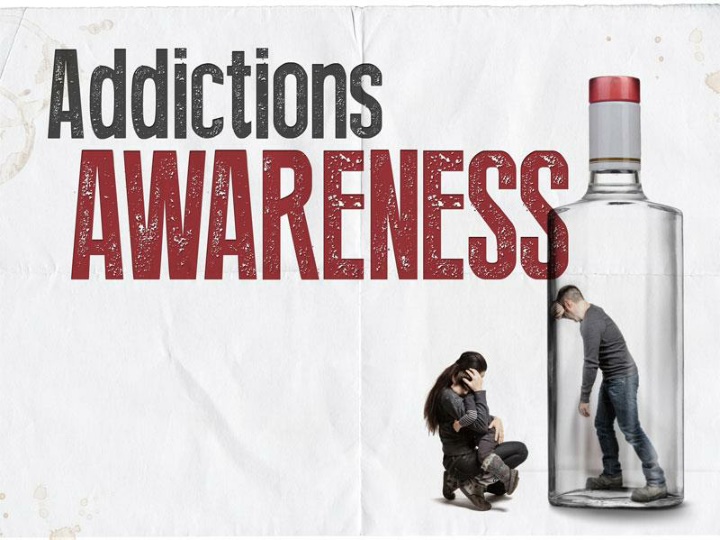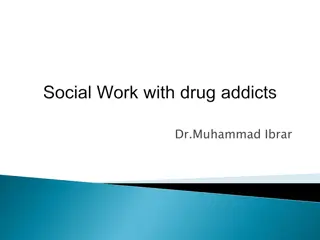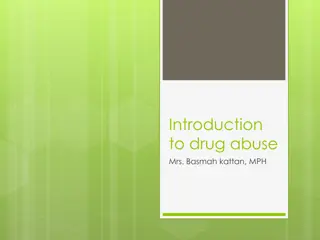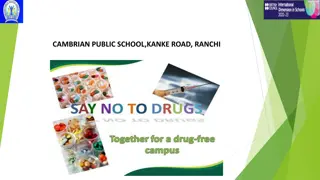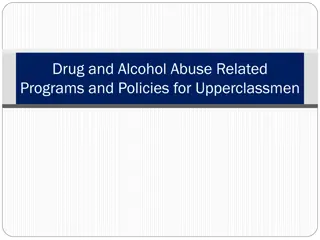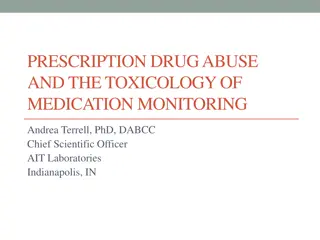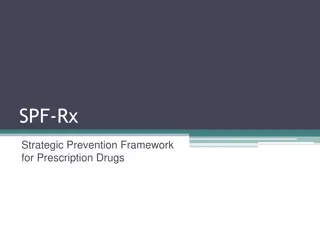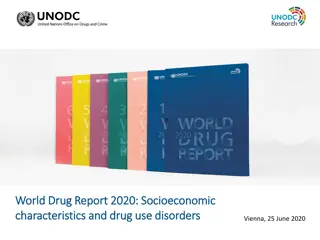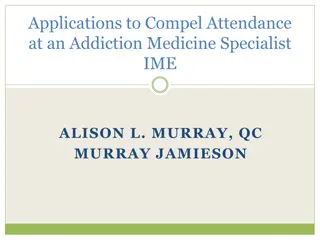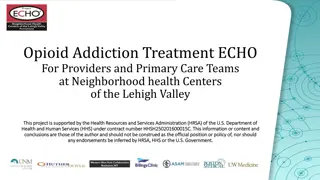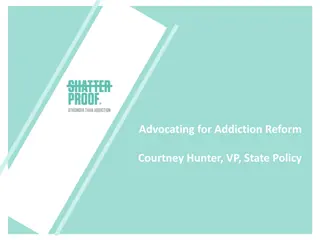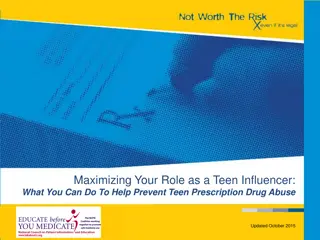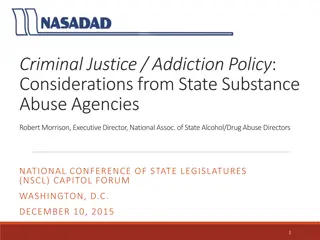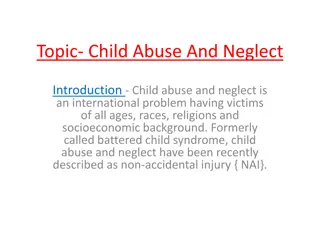Drug Abuse and Addiction
A drug is a chemical substance that can alter body and mind functions. People abuse drugs to feel good or alleviate negative emotions, leading to addiction, a brain disease causing lasting effects like mood swings and memory loss. Alcohol, a widely used drug, can be addictive with serious consequences if abused.
Download Presentation

Please find below an Image/Link to download the presentation.
The content on the website is provided AS IS for your information and personal use only. It may not be sold, licensed, or shared on other websites without obtaining consent from the author.If you encounter any issues during the download, it is possible that the publisher has removed the file from their server.
You are allowed to download the files provided on this website for personal or commercial use, subject to the condition that they are used lawfully. All files are the property of their respective owners.
The content on the website is provided AS IS for your information and personal use only. It may not be sold, licensed, or shared on other websites without obtaining consent from the author.
E N D
Presentation Transcript
DRUG? What is a A drug is a chemical substance that can change how your body and mind work. Drugs of abuse are substances that people use to get high and change how they feel.
People abuse drugs for many reasons: They want to feel good. Taking a drug can feel really good for a short time. But even though someone may take more and more of a drug, the good feelings don t last. They want to stop feeling bad. Some people who feel very worried, afraid, or sad abuse drugs to try to stop feeling so awful.
What is ADDICTION? When a drug user can t stop taking a drug even if he wants to, it s called addiction. When people start taking drugs, they don't plan to get addicted. They like how the drug makes them feel. They believe they can control how much and how often they take the drug. However, drugs change the brain. Drug users start to need the drug just to feel normal. That is addiction, and it can quickly take over a person's life.
ADDICTION is a brain disease Drugs change how the brain works, These brain changes can last for a long time, They can cause problem like mood swings, memory loss and trouble thinking.
What isALCOHOL? Alcohol is a drug that slows down parts of your brain. Drinking alcohol can make you feel more relaxed. It can also make it harder to think clearly, make good decisions and do various tasks.
Who uses alcohol? Most Canadian adults drink alcohol, and do so responsibly. But because alcohol is a drug, there may be risks if you drink any amount of alcohol.
Is alcohol addictive? Yes, alcohol can be addictive. People with an addiction may have difficulty stopping by themselves, even it they want to, and even if other negative effects (such as financial or other personal problems) begin to outweigh the positive effects.
About one person in 20 who drinks is dependent on alcohol. Alcohol dependence can also cause major problem with friends, family, school, work, emotional and mental health, the law and money!
Did you know that: 1 glass of wine, or 1 beer, or 1 shot is the same as 1 standard drink?
How does alcohol make you feel? Alcohol may slow your reflexes, movement and thinking. For a short time, alcohol can make you feel: More calm and relaxed More talkative Less shy Warm (skin may be flushed)
Alcohol can make people aggressive. For others, drinking can depress them or make them more depressed. When people are intoxicated (drunk), they may: Have blackouts (lose their memory) Feel sleepy or lose consciousness
Be more likely to have falls and other accidents Get alcohol poisoning or die Take more risks and make bad decisions
Is alcohol DANGEROUS? Yes, alcohol can be dangerous in a number of ways. Too much alcohol can cause a hangover (headache, feeling sick, shakiness, and vomiting). Too much alcohol can also cause alcohol poisoning and even death.
BINGE DRINKING? What is Binge drinking is defined as consuming 5 or more drinks at one sitting for males and 4 or more for females. Youth have a tendency to drink to purposely get drunk. There are significant dangers associated with binge drinking.
Long-term effects of alcohol use may include: Brain damage Heart disease Physical dependence
Women who drink Run a higher risk of being victims of sexual assault. Alcohol is the # 1 drug, which facilitates assaults and sexual assaults. If pregnant, the risk of giving birth to a baby with behaviour problems (Fetal Alcohol Spectrum Disorder) or birth defects increases. Women don t weigh the same as men so the same amount of drinks as a man will affect her more.
Alcohol and athletics Impairs judgment Decreases reaction time, balance Dehydrating effect: - Heart rate increase - Circulation decreased - Fatigue - Performance reduced
Abrupt withdrawal effects People who often drink a lot for a period of time, or binge, may feel bad or even experience serious physical effects when they stop drinking or cut down. They may: Feel nervous and jumpy Have tremors (the shakes ) Have sleep problems Have seizures Have hallucinations They are called withdrawal symptoms.
Is alcohol legal? Yes, alcohol is a legal drug if you are of legal age. In Nunavut you must be at least 19 years old to buy or drink alcohol.
Or FALSE TRUE If a female and a male both have an average body type and weigh the same, drinking the same amount of alcohol will have the same effect on each of them. T F Some people can drink a lot without seeming to get drunk. T F Drinking coffee, working up a sweat, or having a cold shower will sober you up. T F T F Beer is less harmful to the body than other types of alcohol.
ANSWERS FALSE Males have more water in their bodies than females. This means the alcohol gets more diluted in males, and so a male will notice less effect than a female of the same body weigh and body type who drank the same amount of alcohol. TRUE A person who often drinks a lot may not look drunk because his or her body is used to the alcohol. But even if a person doesn t look drunk after drinking, the alcohol still has an effect. FALSE Only time will make you sober. Your liver needs about 1.5 hours to eliminate one standard drink from your body. FALSE There is the same amount of alcohol in a 12 once beer as there is in 1.5 ounces of hard liquor.
MARIJUANA? What is Marijuana, hashish and hash oil come from Cannabis sativa, a type of hemp plant. All three contain THC, a chemical that changes the way you think, feel and act. The word Cannabis is used to refer to all three.
What does marijuana look like? Marijuana is a green, brown or grey mixture of dried and shredded hemp leaves, stems, seeds and flowers. Marijuana is often rolled in paper so it looks similar to a cigarette. A common slang name for this is a joint. Street names: weed, pot, herb, joint, dope, hash, grass, Mary Jane, bud.
Who uses marijuana? Marijuana is the most commonly used drug in Canada.
Can you get addicted to MARIJUANA? Yes, you can. Some people have a hard time quitting and have to find treatment. They may feel they need the drug, and get anxious when they don t have any.
Is marijuana HARMFUL? Yes, if you smoke marijuana, it can harm you. Many people don t know this, but marijuana smoke contains more tar and more of some cancer-causing chemicals than tobacco smoke.
Short term effects of marijuana use may include: Mild paranoia, anxiety or panic Impaired reaction time, reduced coordination Increased appetite and short-term memory impairment are common Hallucinations, red eyes Increased heart rate and decrease in blood pressure (this could lead to fainting)
Long term effects of marijuana use may include: Reduced motivation and concentration Interference with school and job performance Respiratory problems due to smoking Impaired memory Psychosis (drug induced or mental illness) Increased severity of mental illness
TRUE FALSE or Marijuana is natural, so it can t be bad for you. T F All marijuana is the same strength Isn t smoking marijuana less dangerous than smoking cigarettes? T F Can people become addicted to marijuana? T F Can smoking marijuana affect my school performance? T F
ANSWERS FALSE A lot of natural things are poisonous, like snake venom and certain plants. When you smoke marijuana, it releases harmful chemicals into your lungs. FALSE There is a great variation in how strong marijuana can be. TRUE Research confirms you can become hooked on marijuana. TRUE THC remains in your brain for days or weeks, and may affect your memory speech and learning. Using marijuana regularly also affects your thinking and can make you less motivated.
What are INHALANTS? Inhalants are invisible, volatile substances found in common household products that produce chemical vapors that are inhaled to induce psychoactive or mind altering effects.
What do they look like? All produce chemical vapors that can be inhaled. Common household products such as glue, lighter fluid, cleaning fluids and paint. Gasoline and propane are also very dangerous. Sniffing
Bagging sniffing or inhaling fumes from substances deposited inside a plastic or paper bag. Huffing from an inhalant-soaked rag stuffed in the mouth, or inhaling from balloons filled with nitrous oxide.
Is inhalant HARMFUL? Yes, they can permanently damage your body and brain. Inhalants can kill you the very first time you use them.
Long-term effects of inhalant use may include: Weight loss Muscle weakness Disorientation Inattentiveness Lack of coordination Irritability Depression Irregular and rapid heart rhythms that lead to heart failure and death within minutes. Nausea and nosebleeds Losing your sense of hearing or smell
What are the signs of inhalant use? Slurred speech Drunk, dizzy, or dazed appearance Unusual breath odour Chemical smell on clothing Red eyes, runny nose Spots or sores around the mouth
TRUE Or FALSE Since inhalants are found in household products, aren t they safe? T F Doesn't it take many huffs before you re in danger? T F Can inhalants make me lose control? T F
ANSWERS FALSE Even though household products like glue and air freshener have legal, useful purposes, when they are used as inhalants they are harmful and dangerous. FALSEOne huff can kill you. Or the 10th. Every huff can be dangerous. TRUE Inhalants affect your brain and can cause you to suddenly engage in violent, or even deadly, behavior.
What can you do to help someone who is using marijuana, inhalants or other drugs? Be a real friend. Encourage your friend to seek professional help.
How can I get help? Do you, a family member or a friend have a problem with substance abuse? If you want help, you may want to talk to someone you trust, such as the nurse, a counselor, a mental health professional, a teacher or doctor at your local health centre.
Here are some other contacts for help: Kids Help Phone at 1-800-668-6868 (24/7) Nunavut Help Line at 1-800-265-3333 (24/7) Alcoholics Anonymous at 1-888-616-4011 Sources: Centre for Addiction and Mental Health National Institute on Drug Abuse Substance Abuse and Mental Health Services Administration, Tips for Teens
